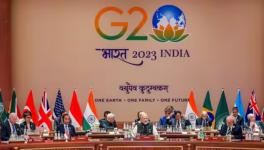G7 Corporate Tax Deal – Setting the Bar Too Low?
A recent report by ProPublica has revealed how multibillionaires from the US, including Amazon’s Jeff Bezos, Tesla’s Elon Musk, Microsoft’s Bill Gates and Facebook’s Mark Zuckerberg, among others, have managed to avoid paying federal taxes over the last few years. The report revealed that Bezos, the world’s richest man, paid no federal income taxes in 2007 and 2011; Musk achieved this feat in 2018. Others, including Michael Bloomberg, billionaire investors Carl Icahn and George Soros have also paid zero federal income taxes a number of times over the last few years.
Interestingly, this report comes a few days after the world’s wealthiest nations reached an agreement to tackle tax avoidance by multinational conglomerations and fix a global minimum corporate tax rate.
On June 5, finance ministers from the Group of Seven (G7) rich nations agreed on a deal that is touted to be a ‘historic step’ towards reshaping the global tax landscape. The deal proposes to do two things globally: create a more uniform corporate tax structure and minimise profit shifting by multinationals. US Treasury Secretary Janet Yellen claimed that the deal aimed to end a ‘30-year race to the bottom on corporate tax rates’, as countries compete to lure multinationals. Further negotiations on the deal will be carried out in the G20 summit scheduled to be held in Venice next month.
The G7 came to an agreement that countries will tax corporate profits at a minimum rate of 15%. The agreement also aims at tackling the problem of tax avoidance by large multinational corporations by shifting their profits to tax havens. A tax haven is a low-tax or no-tax jurisdiction whose laws or rules can be used to evade or avoid tax laws or regulations of other jurisdictions.
In order to avoid payment of taxes, multinational companies use a tool known as Base Erosion and Profit Shifting (BEPS), whereby differences in tax rules across jurisdictions lead to double non-taxation or less than a single taxation. It also includes arrangements that achieve no or low taxation by shifting profits away from jurisdictions where activity takes place. This is done by migrating income from intangible sources such as drug patents, software and royalties on intellectual property to low-tax or no-tax jurisdictions, thereby allowing companies to avoid paying higher taxes in their traditional home countries.
In an interview with senior journalist Paranjoy Guha Thakurta, Monica Bhatia, Head, Global Forum on Transparency and Exchange of Information in Tax Matters (OECD), explained: “In recent times, the governments of many developed and developing countries have been seeking to discourage the use of tax havens. One of the most talked-about such moves is Base Erosion and Profit Shifting (BEPS) initiative of the Organisation for Economic Co-operation and Development (OECD). The OECD is a grouping of some of the richest countries in the world. The countries that had at one time actively encouraged, or even turned a blind eye towards the use of tax havens to avoid and evade payment of taxes, have today veered round to the view that such jurisdictions not only deprive governments of revenues, but also connive in a host of illicit activities.”
The ProPublica report published on June 9 revealed that the 25 richest Americans saw their worth rise collectively by $401 billion between 2014 and 2018, even as they paid a total of $13.6 billion in federal income taxes in those five years. In comparison to this staggering gap, average middle class Americans saw their wealth expand by about $65,000 after taxes between 2014 and 2018 (mostly due to the rise in the value of their homes), while their tax bill reached close to $62,000 over that period.
In the recent accord, the G7 has agreed upon two pillars of reforms:
-
Setting a minimum global corporate tax at 15%. This rate is lower than a 21% proposal put forward by US president Joe Biden earlier this year.
-
Enabling countries to tax some of the profits made by big companies based on the revenue they generate in that country, rather than the in jurisdiction where the firm is located for tax purposes. Under this measure, countries where multinationals generate revenue would be awarded new taxing rights on at least 20% of the profit exceeding a 10% margin for the largest and most profitable firms.
According to OECD estimates from October 2020, the reforms proposed will raise as much as $81 billion in additional tax revenues. While the global minimum tax at the rate of 12.5% is expected to raise between $42 billion and $70 billion, the second reform will bring in between five billion dollars and $12 billion. Tax Justice Network estimated that a minimum rate of 21% will bring in $640 billion of underpaid tax.
While the estimates for how much tax revenues individual countries will generate varies, the UK is expected to reap an extra 14.7 billion Pounds annually from a global minimum rate of 21%. Ireland, which levies a corporate tax at a low 12.5% may end up losing up to 2 billion Euros a year.
Criticising the corporate tax rate of 15% as too low, Gabriela Bucher, Executive Director of Oxfam, said: “It’s absurd for the G7 to claim it is ‘overhauling’ a broken global tax system by setting up a global minimum corporate tax rate that is similar to the soft rates charged by tax havens like Ireland, Switzerland and Singapore. They are setting the bar so low that companies can just step over it.”
“In a world beset by a pandemic, at a time of such desperate need, the G7 looked at corporate balance sheets bursting at the seams with over-inflated profits ―and immediately looked away…President Biden’s 21% while far from enough was the highest rate proposed, and some European countries, in hock to their own home-grown tax havens, fiercely defended an even cheaper rate, below 15%,” she added
Elaborating on its impact on developing countries, Bucher argued that the deal will overwhelmingly benefit rich countries and increase inequality as billions of dollars in revenues lost to tax havens each year would flow to wealthy countries where most of the multinationals like Amazon and Pfizer are headquartered, even if their sales and profits are actually made in developing countries.
In response to the G7-agreement, tax experts have argued that a minimum global corporation tax rate of 15% will benefit India as the effective domestic tax rate is above the threshold and the country will continue to attract investment. In April, however, it was reported that the Indian government was not in favour of the new minimum tax rate and it was argued that the new proposal would not be favourable to the Indian economy or Indian businesses. This was at a time when the United States was suggesting a global minimum tax rate of 21% and the Independent Commission on Reform of International Corporate Taxation (ICRICT) was endorsing a minimum tax global rate of 25%.
In September 2019, India had cut down its corporate tax for domestic companies from 30% to 22% and to15% for new manufacturing units. Earlier in June, it was reported that for the first time in years, corporate tax collections fell below personal income tax collections last fiscal on account of the adverse impact of the COVID-19 pandemic on businesses and lower tax rates that came into effect two years ago. Corporate tax levies on corporate profits had contracted by 18% in 2020-21 while personal income tax collections fell by 2.3 per cent. According to data released by the Controller General of Accounts, corporate income tax collections were at Rs. 4.57 lakh crore and the same for personal income tax was Rs. 4.69 crore in 2020-21.
Clearly, a minimum rate of 15% for corporate income tax would not alter the declining revenue generation from corporates in India. How the G20 reacts to this accord and how these plans are implemented, remains to be seen.
The writer is an author and a Research Associate with Newsclick. The views are personal. She can be reached on Twitter @ShinzaniJain.
Get the latest reports & analysis with people's perspective on Protests, movements & deep analytical videos, discussions of the current affairs in your Telegram app. Subscribe to NewsClick's Telegram channel & get Real-Time updates on stories, as they get published on our website.
























